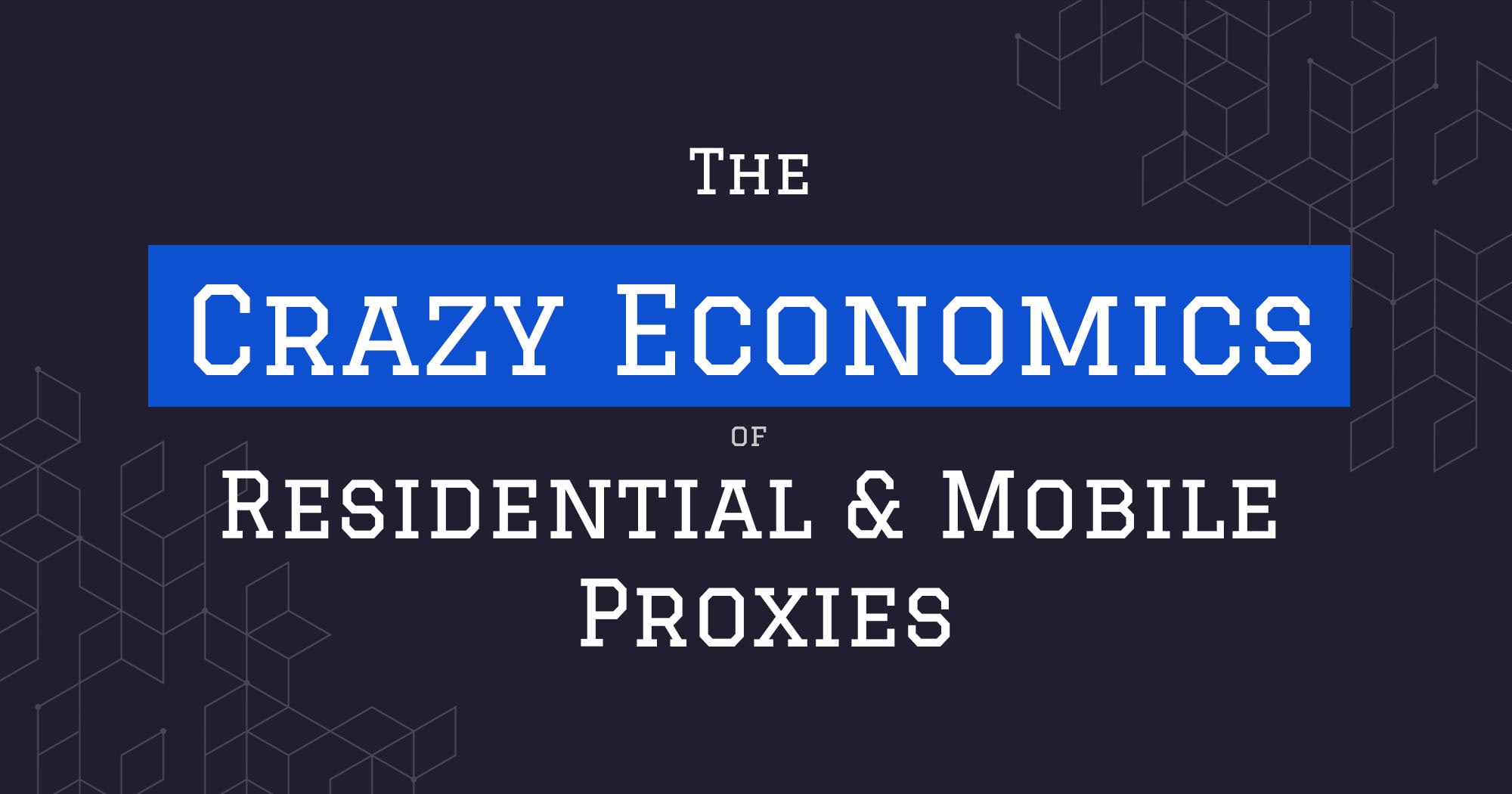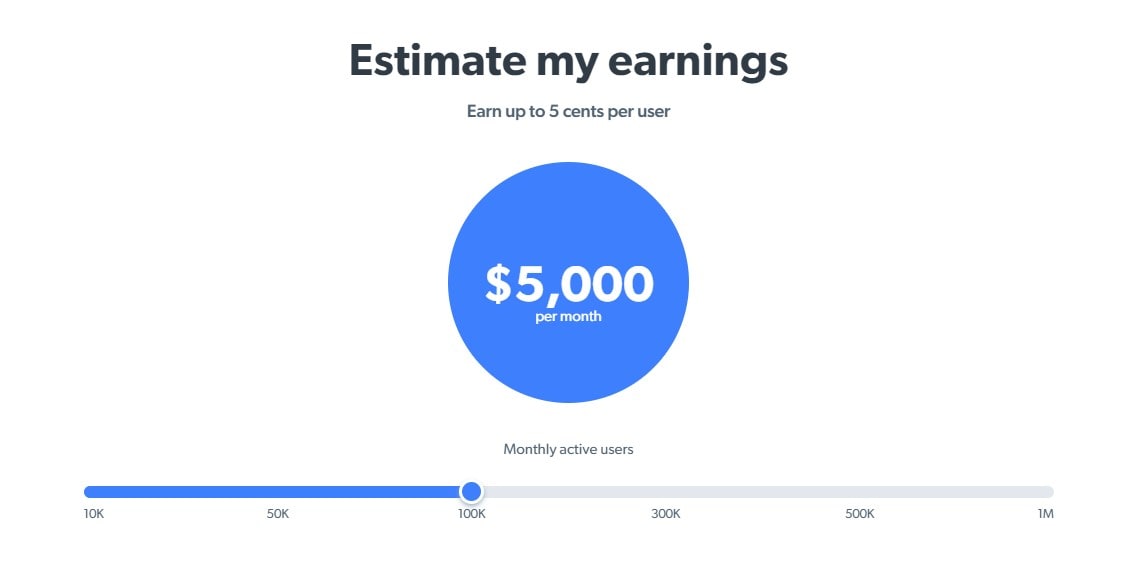
The Crazy Economics of Residential & Mobile Proxies
Developers and companies can make a lot of money in the web scraping market. Be it providing web scraping services, tooling, or building products on top of web scraped data.
However, there is one area of the web scraping industry that has the craziest economics...residential & mobile proxies!
Most web scraping proxy providers have good 75-90% gross margins, however, proxy providers who own their own residential & mobile IP networks are on a completely different level.
You can get residential & mobile proxies in lots of different ways. But when they acquired using embedded SDKs in Apps & Chrome Extensions is when they really make the big money!
Let's explain...
Need help scraping the web?
Then check out ScrapeOps, the complete toolkit for web scraping.
Embedded App & Chrome Extension SDKs
Although there are different ways to build to a residential & mobile proxy network, like building proxy farms or peer-to-peer networks.
The most efficient way to build a large and diverse residential & mobile proxy network is by piggy backing on existing Android, Windows or macOS apps and Chrome Extensions.
Here, instead of an App or Chrome extension developer having to monetise their free product with ads, they can integrate the SDK of one of the large proxy providers into their product and get paid for every monthly active user they have.
Two of the most popular include the Bright Data SDK and Infatica SDK.
Once embedded, these SDKs allow end users to opt-in to having ad free access to the App or Chrome Extension in exchange for the proxy provider being able send traffic through their device for the purposes of web scraping, ad verification or website testing.
This can be good for developers and end users because:
- Opt-In: End users can explicitedly opt-in to having an ad free experience in exchange for their bandwidth being used.
- Better UX: End users have a better user experience if they aren't being interupted by ads.
- Predictable Revenue: The developers of these Apps and Chrome extensions get predictable revenue of $1,000 - $50,000 per month.
However, it is the proxy providers that really win big.
$$$ Insanely Profitable
The big winners of this approach to getting residential & mobile proxies are the proxy providers, because this business model is insanely profitable!
On average, proxy providers will pay the owners of these Apps & Chrome extensions $0.05 for every MAU (monthly active user) the App has.

However, these proxy providers charge their customers between $2 to $15 per GB of traffic sent through their residential proxy networks.
Even charging as high as $10 to $40 per GB for traffic sent through their mobile proxy networks.
Given that the proxy provider can easily send 10-20 GB of traffic through each App or Chrome Extension their SDK has been installed in each month, the proxy provider can be easily making $100-500 for every MAU but only paying $0.05 to send the traffic.
In essence they acquire their proxy network at a fixed price of $0.05 per MAU, but they charge their customers a much higher rate based on the traffic they send through the proxy network.
That is a dream business model!
So if I'm the developer of a popular Android App with 100,000 monthly active users and I integrate with Bright Data's SDK then:
- Users: Get ad free experience in exchange for their bandwidth.
- Developer: Makes $5,000 per month for installing the SDK into the App ($0.05 per MAU).
- Proxy Provider: Makes $10,000,000 per month from their proxy customers (assuming 10GB bandwidth per MAU & charging proxy users $10 per GB)
That is a $9,995,000 per month profit on a single App that has integrated the SDK!

Obviously, the proxy provider will have other expenses to deduct from operating the proxy network (servers, infrastructure, developers, etc.).
But still, they almost certainly will have a 99.9% profit margin on $10 million in revenue!
Little wonder that Bright Data, the pioneer of this strategy, recently announced they surpassed the $100 million mark in annual revenue.
Proxy Providers Building App Networks
This business model is highly profitable, but much harder to execute than simply buying datacenter IPs or access to residential/mobile proxy networks from other providers.
As a result, only a few big providers have been able to pull this off:
Bright Data
Bright Data (formerly Luminati) pioneered this business model when they first integrated it into their sister company's product, the HolaVPN. HolaVPN offered users a free VPN in exchange for their device being used by Luminati as a proxy.
Then later, Bright Data started allowing 3rd party App and Chrome extension developers integrate the SDK into their products.
This strategy was a huge competitive edge for Bright Data as they quickly grew to become the largest proxy provider, offering some of the most professional and sophisticated proxy services for developers and companies. And building a very big business in the process.
OxyLabs
For a time Oxylabs, the second largest proxy provider in the market, also had a 3rd party App and Chrome extension SDK program as they built out their own residential and mobile proxy networks.
With their SDK believed to be included in :
- AppAspect Technologies' EMI Calculator and Automatic Call Recorder
- Birrastorming Ideas S.L’s IPTV Manager for VL
- CC Soft’s Followers Tool for Instagram
- Glidesoft Technologies’ Route Finder
- ImaTechInnovations’ 3D Wallpaper Parallax 2018
- Softmate a/k/a Toolbarstudio Inc.�’s AppGeyser and Toolbarstudio
However, Oxylabs doesn't seem to offer their SDK to 3rd party developers anymore. Possibly after the patent infringement litigation Bright Data settled against OxyLabs in 2018.
Today, Oxylabs appears to use different methods to build its proxy network including Honeygain.com.
Infatica.io
A more recent adopter of this approach has been Infatica.io, who are also providing App developers a SDK that they can integrate into their codebase and monetize their active users.
They offer developers between $0.04-$0.06 per monthly active user their App has when integrating the SDK into their Apps.
Ethics of Integrated Proxy SDKs
When proxy companies and developers started using the model of integrating proxy SDKs into Apps this practice had a lot more questionable ethics.
Over the years, there have been lots of users & developers complaining about this practice:
- No Consent: Developers were including the SDKs without informing users.
- App Store Bans: Some developers had their Apps removed from App stores because of the SDKs.
- Malware Claims: Concerns these SDKs might include malware.
- Bad Traffic: Users devices being used in DDoS and other attacks.
However, in the last year or two, proxy companies and developers have taken a much more responsible and ethical approach to how their SDKs are integrated and used.

For Example: Bright Data positions its SDK as an Ethical SDK. Requiring App users to explicitedly opt-in to having Bright Data use them as a proxy endpoint. They have also introduced strict KYC requirements for all new users of their residential & mobile proxy networks when they sign up to ensure end-user phones & laptops aren't used for illegal or questionable use cases.
More Web Scraping Articles
This was a deep dive into one of the lesser known aspects of the web scraping market.
If you would like to learn more about proxies or web scraping in general, then be sure to check out The Web Scraping Playbook, or check out one of our other in-depth guides: